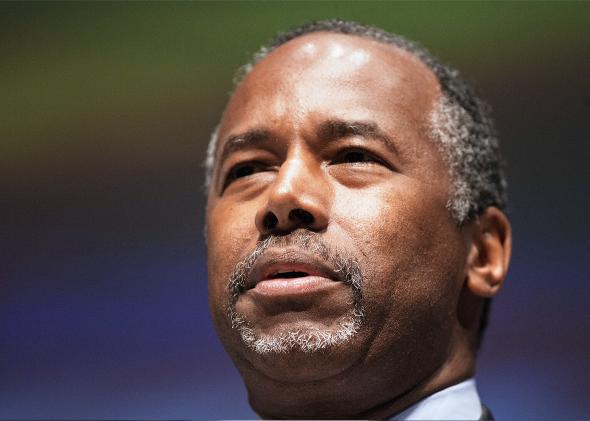Ben Carson believes he’s getting a raw deal. “I have always said that I expect to be vetted. But being vetted and what is going on with me—‘You said this 30 years ago, you said this 20 years ago, this didn’t exist, this didn’t’—you know, I just, I have not seen that with anyone else,” said Carson in an interview with NBC’s Chris Jansing.
It’s easy to understand his frustration. In the past week, journalists have begun to make more and deeper inquiries about his background, which has led to a few uncomfortable questions for the former neurosurgeon. Did Carson actually try to stab a friend as a teenager, a key story for the redemption narrative in his book? Did he reject a scholarship to West Point, like he says in his book? Was he really rewarded for honesty as a student at Yale?
For Carson, these questions are all clear evidence of liberal media bias. His evidence? President Obama. “I do not remember this level of scrutiny for one President Barack Obama when he was running,” he said during a press conference on Friday. “In fact, I remember just the opposite.” Carson wasn’t alone with this thought. “The collective goal of the liberal media is now clear,” wrote David French for National Review, “to take one of America’s most admired and brilliant men and somehow transform him into a dishonest, stupid extremist.” French continued his indictment: “A ‘high-tech lynching’ is again underway,” he said.
Other conservatives were similarly empathetic. “Media scrutinize GOP with passion,” said columnist Jonah Goldberg on Twitter. “Scrutinize Dems with grudging sense of duty, if at all. Big difference.” Likewise, said conservative commentator Michelle Malkin in reference to Carson and Obama, “The double standards here are as glaring as a supernova.”
For the most part, this is typical. Conservatives share a deep belief in liberal media bias, and specifically, the idea that the press is unfair to Republican candidates. Indeed, Texas Sen. Ted Cruz’s rant against this alleged bias at the previous Republican presidential debate earned him huge applause and praise from the crowd. Carson has used this rhetoric throughout his campaign, so it’s no surprise he’s deployed it after a week of questions and criticism.
At the same time, he and other conservatives are also making a specific claim—that Obama wasn’t “vetted” by the press, or at least that he had a gentler time. The nice thing is that we can check this; we can dig through the archives and see how Obama was treated in his campaign for the Democratic nomination. And what do you find when you check the record? That Carson, and his conservative defenders, are wrong.
Let’s take the most explosive stories of Obama’s first campaign for president: his relationships with Jeremiah Wright, Bill Ayers, and fundraiser Antoin Rezko. Historian Kevin Kruse searches the New York Times alone, from mid-2007 to the end of the election in November 2008, and finds 138 stories that refer to Obama and Wright, 78 that refer to Obama and Ayers, and 38 that refer to Obama and Rezko. NBC News did a similar search with similar results, finding a combined 206 Times and Washington Post stories that centered on—or referred to—either Obama and Wright or Obama and Ayers. And more recently, there’s been a torrent of stories on Hillary Clinton’s email practices, including major pieces at the Times and the Post.
Likewise, throughout the campaign, there were stories on Obama’s drug use as a student, on his time as a community organizer in Chicago, and on his birth certificate.
By the time he won the Democratic nomination, Americans knew a lot about Obama’s life and views. If there were serious questions, they came from the fever swamps of the online right, where Obama was an unqualified affirmative action student who was mentored by radicals and enlisted as a Manchurian candidate devoted to America’s downfall.
Which raises a question: What do conservatives mean when they say Obama wasn’t scrutinized or vetted? It could be partisanship; they don’t like Obama, so they can’t imagine that there’s nothing truly negative or damaging in his past. Or, it could just be that—despite the digging and the questions—Americans elected Obama anyway. The public saw Jeremah Wright and learned about Bill Ayers and decided—when it was time to vote—that Obama deserved a shot at the White House. Four years later, to the dismay of many conservatives, they made that choice again.
The truth is that, compared with Obama, it’s the press-averse Carson who needs to take more questions about his past and his policies. And in this upcoming presidential debate, hosted by Fox Business, he’ll at least have to face them.
